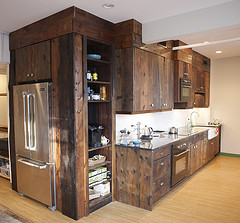Closed Loop Recycling: What it Means for You
 If you're a regular recycler, determinedly hauling your bottles, cans, and paper to the curb or to dedicated drop-offs, more power to you. You are working hard to keep our planet green. However, this effort addresses just a part of the recycling equation. For the process to work as it's intended, someone (or, more likely, some corporation) has to be ready to pick up the materials and transform them into usable goods, which, in turn, consumers must choose to buy. This entire multi-step process, encompassing the entire product lifecycle, is referred to as closed loop recycling.
If you're a regular recycler, determinedly hauling your bottles, cans, and paper to the curb or to dedicated drop-offs, more power to you. You are working hard to keep our planet green. However, this effort addresses just a part of the recycling equation. For the process to work as it's intended, someone (or, more likely, some corporation) has to be ready to pick up the materials and transform them into usable goods, which, in turn, consumers must choose to buy. This entire multi-step process, encompassing the entire product lifecycle, is referred to as closed loop recycling.
Why Recycle?
Proponents of recycling tend to emphasize the importance of creating a cleaner planet. That's an excellent reason to recycle, but there are many additional benefits, which may appeal to members of your household who are less idealistic. Here are some of the advantages of recycling.
Reduces landfills. Landfills are ugly. In addition, many of them are, to put it bluntly, simply running out of space, with remaining capacities of perhaps another 30 years or less. And if you look at it in terms of dollars and cents, recycling tends to be a less expensive means than landfill dumping for local governments to manage waste.
Saves natural resources. Fewer trees need to be cut down to produce wood pulp, for example, when consumers use toilet tissue and greeting cards made from recycled paper. What's more, recycling saves valuable land. If oil- or mineral-based products are recycled, fewer acres will be needed to devote to drilling and mining.
Reduces pollution in air and water. Using recycled materials rather than virgin content results in a lowered pollutant emission rate from the production process. Toxic gases from waste incineration are also lessened.
Is more energy-efficient. Manufacturing products from recycled materials, in general, consumes less energy than the alternative.
How to Make Wise Purchasing Choices
Making wise purchasing choices based on environmental impact is also a process which comprises a number of factors.
Start by deciding whether the item you are considering is really needed or is likely to end up just adding to your household clutter.
Choose goods that are durable and will not be need to be replaced quickly.
Buy recyclable products. Make sure that the type of material(s) they contain can easily be recycled in your community, either via your local curbside pickup program or at a nearby drop-off center.
Select products that contain a high percentage of recycled content. If something is labeled simply "recycled," that indicates that it contains 100 percent recycled material. Otherwise, the percentage should be clearly shown. If you have any questions or complaints about labeling, contact the Federal Trade Commission. Also check the recycled percentage of the packaging -- or buy unpackaged items, such as bulk dry goods at the grocery store.
The United States Conference of Mayors (USCM)'s has developed a "Buy Recycled" initiative which details consumer products containing recycled content.
Building Materials
An area close to our hearts here at Networx is the subject of reclaimed and recycled home building materials.
Reclaimed (aka reused or salvaged) construction components include such things as old barn wood, which are used more or less "as is." Reclaimed features are trendy and sought-after in the field of house building and remodeling. They often provide a quality and patina impossible to find in newer materials.
By contrast, recycling involves the transformation of waste materials into usable products. The home construction industry is making great strides in this area, using recycled content in many common materials ranging from hardworking asphalt, insulation, and bottle bricks, for instance, all the way to decorative touches like gorgeous glass tiles and kitchen countertops.
If you are planning to build or remodel a home, consult with your contractor about how to integrate recycled materials.
Laura Firszt writes for networx.com.
Looking for a Pro? Call us (866) 441-6648

Remodeling Average Costs
Remodeling Contractors Experiences

“Stealth” Tree Trimming Was An Incredibly Clean Job

Yard Cleanup And Lawn Care Service With A Great Work Ethic



